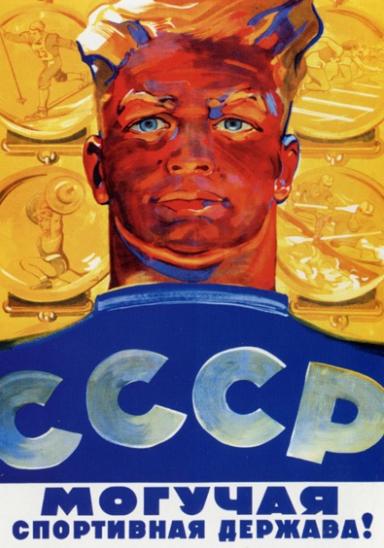Once upon a time sportsmen were heros and role models, a shining moral example for all of society as to the values of a strong work ethic and a healthy body.
I love these Soviet era posters and the way they capture the spirit of the time, something special about the purity of the collective sporting effort.
Of course today, sport is about different things. The political and behavioural symbolic value of sport has been replaced by sport as a commodity. Sports stars exist as brand heroes in our shopping centres and glossy magazines, the sometimes lurid details of their everyday lives trumpeted on the pages of such magazines as Hello! and the gossip pages of the internet.
Compare photographs of Olympians Svetlana Khorkina (1996, 2000 and 2004) and Ludmilla Tourischeva (1972, 1976):
Khorkina is in all her glamour shot, sexually charged splendour;
Tourischeva, the highly responsible headmistress, perhaps a local Justice of the Peace
Societal, political and demographic changes have influenced the identity and form of artistic gymnastics as a sport. These changes have influenced the format of competitions, the way coaches work, the composition and membership of teams, the focus, contents and workings of the Code of Points and judging systems, the language of the sport and ultimately the way the sport is created and seen itself.
This is just a brief post to introduce a theme to the blog which I will be developing through a series of short reflections in future. As a starting point, there is a fantastic article by sports historian Jim Riordan (1936-2012) which I will review in the coming days, and hope to build on.
 |
| USSR is a might sports power! B. Reshetnikov, 1962 Picture courtesy of A Soviet Poster a Day |
Of course today, sport is about different things. The political and behavioural symbolic value of sport has been replaced by sport as a commodity. Sports stars exist as brand heroes in our shopping centres and glossy magazines, the sometimes lurid details of their everyday lives trumpeted on the pages of such magazines as Hello! and the gossip pages of the internet.
Compare photographs of Olympians Svetlana Khorkina (1996, 2000 and 2004) and Ludmilla Tourischeva (1972, 1976):
Khorkina is in all her glamour shot, sexually charged splendour;
 |
| Svetlana Khorkina, undated |
Tourischeva, the highly responsible headmistress, perhaps a local Justice of the Peace
 |
| Ludmilla Tourischeva shortly before the 1976 Olympics |
This is just a brief post to introduce a theme to the blog which I will be developing through a series of short reflections in future. As a starting point, there is a fantastic article by sports historian Jim Riordan (1936-2012) which I will review in the coming days, and hope to build on.